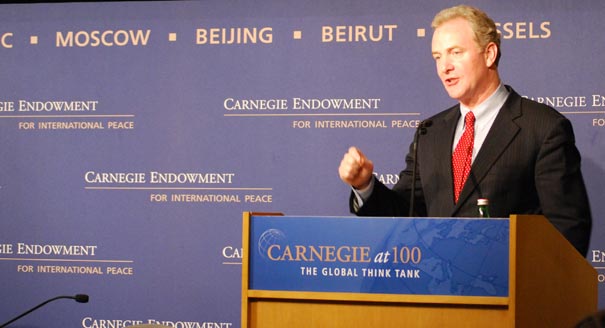Registration
You will receive an email confirming your registration.
Last year witnessed a series of heated debates over the economy—on unemployment insurance, free trade, taxes, government spending, and the deficit. With elections looming in November, can Republicans and Democrats find common ground on the economy, or are we due for a year of partisan gridlock?
Congressman Chris Van Hollen, the senior Democrat on the House Budget Committee and a member of the Congressional “Supercommittee,” discussed the state of the economy and what steps Congress can realistically take during the months ahead to reduce unemployment and improve America’s long-term economic outlook.
Back from the Brink
Van Hollen emphasized that the U.S. economy, though still weak, is markedly stronger than it was during the depths of the crisis.
- Private Sector Growth: The private sector added 257,000 jobs in January—many more than expected—marking the 23rd consecutive month of private sector job growth.
- Withdrawing the Stimulus: The federal stimulus bill is no longer in effect. The Congressional Budget Office (CBO) estimates that the stimulus created or saved 3 million jobs in 2010 and 2 million in 2011, but since its conclusion, government employment has fallen.
Prospects for 2012
With the recovery still weak and deficits remaining high, Van Hollen underscored the important role Congress should play in returning the economy to a strong and stable footing.
- Political Divisions: Van Hollen conceded that political gridlock will likely prevent congressional leaders from making any tough decisions before the 2012 elections in November.
- Payroll Taxes, Unemployment Insurance: Following the two-month extension of the payroll tax cut and unemployment insurance benefits in December 2011, these measures (along with the Medicare “Doc Fix”) are set to expire in March. Despite the gridlock, Van Hollen expects Congress to address these issues. According to private estimates, failing to extend these measures could reduce 2012 GDP by 0.9 percent.
- Progress in December? Van Hollen noted that the congressional session between the election and 2013 could be productive, just like the post-election session in 2010. The Bush tax cuts expire on January 1, 2013. Furthermore, the debt ceiling “trigger” cuts, or reductions in defense and domestic program spending resulting from the Supercommittee’s inability to reach a deal, are scheduled to go into effect on January 2, 2013. Because these measures are unpopular with both parties, Van Hollen argued that there could be room for agreement.
A Long-Term Plan
Van Hollen emphasized the importance of a balanced, steady, and predictable plan to reduce U.S. debt.
- Recovery Now, Cut Later: Van Hollen said that the United States needs a plan to stabilize or reduce its debt-to-GDP ratio but should be careful not to cut too quickly. Such an approach has been advocated by Federal Reserve Chairman Ben Bernanke, the International Monetary Fund, and Standard & Poor’s, the rating agency that cut the U.S. credit rating, he added.
- Not Greece: Unlike Greece, the United States does not need to urgently reduce its deficit. Rapid cuts could push the United States back into recession, Van Hollen said, as is happening in the United Kingdom.
Van Hollen also outlined the major changes that would be needed to reduce U.S. debt.
- Greater Tax Revenue: Allowing all the Bush tax cuts to expire would raise approximately $6 trillion in revenue over the next ten years, Van Hollen said. While he personally did not support this policy, he noted that it illustrates the importance and potential of tax revenues.
- Tax Code Reform: Because many Republicans have pledged to resist all tax increases, Van Hollen commented that bipartisan tax code reform would likely be part of any budget solution.
- Health Care Costs: The CBO estimates that federal spending on health care programs will nearly double as a share of GDP between now and 2035. The Affordable Care Act took steps that should lower some of these costs, but more must be done, Van Hollen said.
- International Aid: Though cutting international aid may be politically expedient, Van Hollen argued that doing so would be short-sighted—aid spending helps support both diplomatic relations and national security.
Inequality
Van Hollen commented on the rising inequality in the United States.
- The Middle Class: Van Hollen argued that if inequality leads to stagnating middle class wages—as it has in the United States—demand will remain low and economic growth will slow.
- Invest in the Future: Because restoring the middle class will require investments in education and job training, cutting these programs to reduce the deficit would be short-sighted, he added.
- Share the Burden: Van Hollen argued that those at the very top should be asked to pay a little more in taxes while those at the bottom should not be forced to absorb cuts to federal benefits.
